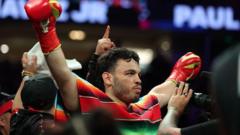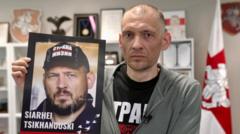In a moment of disarray, the U.S. administration's efforts to negotiate the release of American and Venezuelan detainees fall through due to a lack of coordination among top officials.
# U.S. Diplomacy Efforts Falter Over Negotiations with Venezuela

# U.S. Diplomacy Efforts Falter Over Negotiations with Venezuela
Tensions arise as conflicting U.S. diplomatic strategies fail to secure the release of prisoners in Venezuela.
The Trump administration's efforts to negotiate the release of American prisoners held in Venezuela came to a halt due to conflicting strategies from key diplomats. Secretary of State Marco Rubio was leading an initiative aiming to exchange several Americans and Venezuelan political prisoners for around 250 deported Venezuelan migrants held in El Salvador. However, this plan unraveled as President Trump’s envoy to Venezuela, Richard Grenell, was concurrently pursuing a separate deal with more appealing terms for the Venezuelan government.
Sources familiar with the negotiations have revealed that Grenell’s offer included allowing Chevron to resume its oil operations in Venezuela, a significant source of income for the regime. This dual approach by both officials resulted in confusion, as neither party effectively communicated their intentions to each other, and discussions faltered.
The approximately 250 Venezuelans remain locked up in a high-security facility in El Salvador, illustrating a troubling reality where both governments used detainees as bargaining tools. The strategy not only complicated the diplomatic narrative but also exposed a much deeper divide in U.S. foreign policy regarding Venezuela.
Both Rubio’s and Grenell's discussions were reportedly directed towards the same Venezuelan official, Jorge Rodríguez. The oversight in coordination highlights a recurring theme from Trump’s first term, where competing internal narratives led to diplomatic mishaps. Ultimately, the lack of a unified front prevented progress and left both American and Venezuelan prisoners in a state of limbo, raising questions about the effectiveness of U.S. diplomatic efforts.
Sources familiar with the negotiations have revealed that Grenell’s offer included allowing Chevron to resume its oil operations in Venezuela, a significant source of income for the regime. This dual approach by both officials resulted in confusion, as neither party effectively communicated their intentions to each other, and discussions faltered.
The approximately 250 Venezuelans remain locked up in a high-security facility in El Salvador, illustrating a troubling reality where both governments used detainees as bargaining tools. The strategy not only complicated the diplomatic narrative but also exposed a much deeper divide in U.S. foreign policy regarding Venezuela.
Both Rubio’s and Grenell's discussions were reportedly directed towards the same Venezuelan official, Jorge Rodríguez. The oversight in coordination highlights a recurring theme from Trump’s first term, where competing internal narratives led to diplomatic mishaps. Ultimately, the lack of a unified front prevented progress and left both American and Venezuelan prisoners in a state of limbo, raising questions about the effectiveness of U.S. diplomatic efforts.




















